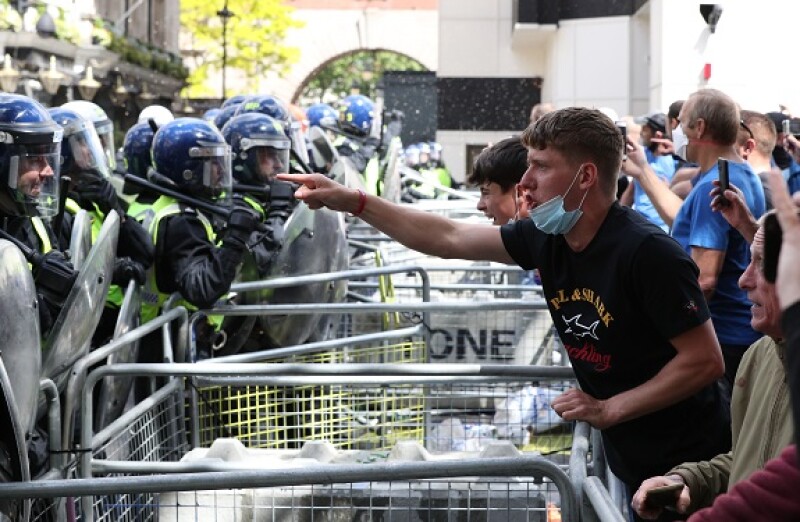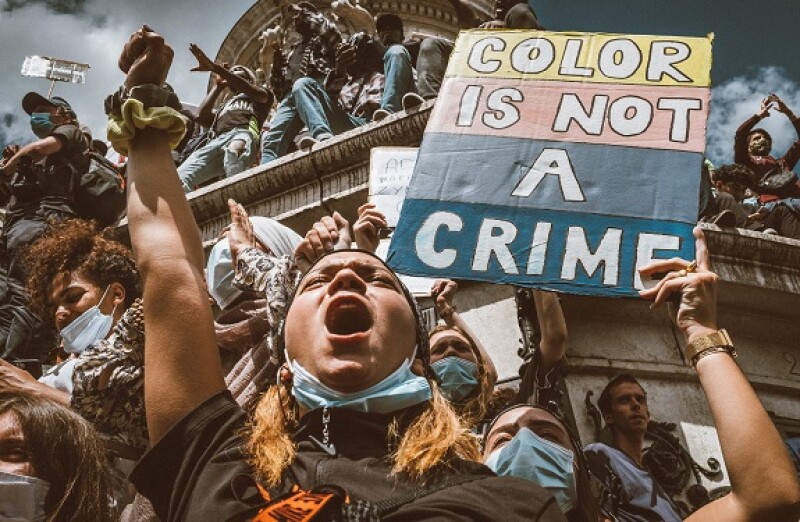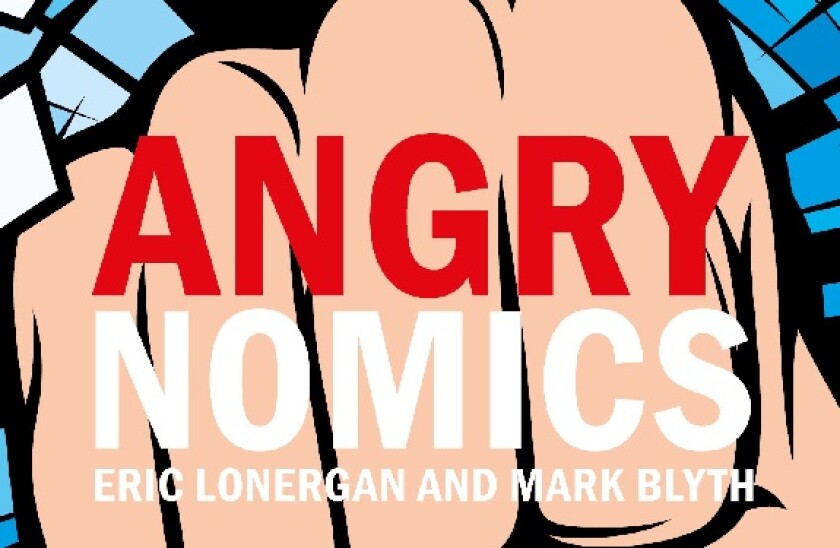The main theme of Angrynomics was on lurid display in London last weekend, when far-right protesters converged on London. They claimed they were present to protect the city’s statues from being vandalised during Black Lives Matters demonstrations, but attacked the police with missiles, kicks and punches.
Much has been said on capitalism’s future since the 2008 financial crisis and the rise of populism in the last five years, with many writers linking the two. So it is remarkable that, in a book of just 200 pages, Lonergan and Blyth find new ground to explore.
In his day job, Lonergan manages several funds at M&G, while Blyth is a political economist at the Watson Institute for International and Public Affairs at Brown University.
Their book explores what is happening in contemporary politics by using anger as a framework. It sounds banal to say people are angry. The authors contend that it helps if we look at different types of anger, and which types are useful and which are not.
They separate out private anger — essentially elevated stress we feel in our individual lives — and public anger, which is wielded at the ballot box and in protests, and divide the latter into two categories.
Moral outrage is a positive form of public anger, based on a clear and demonstrable sense of injustice, that should be listened to and engaged with it. But tribal anger is less reasoned and is based on opposition to another group. This is the dangerous kind.
To go back to the London protesters, some were described as “football hooligans”. This is apt for understanding the book: tribal anger is best thought of as the anger of the hardcore sports fan. But it is best to leave it in the stadium, rather than taking it into politics.

This framework of anger enables movements that a conventional political analysis sees as disparate to be categorised and grouped: from anti-austerity protests, to Extinction Rebellion, to the gilets jaunes in France.
The next step is to link anger to its roots in economic policies over the last century, and its effects on politics today. Finally, the authors offer concrete solutions, involving rethinking government spending, central banks and markets.
The authors’ aim was not to provide a definitive, exhaustive account of what has happened and what must follow, but instead to float ideas as a starting point for discussion; which the book does very well.
Angrynomics is mostly written in the form of a dialogue between Lonergan and Blyth, based on real conversations. This makes it easily digestible and also helps tease out ideas and confront disagreements between the pair.
The coronavirus crisis, which is tackled in a postscript, has thrown into light and exacerbated gross inequalities in western democracies. More recently, George Floyd’s death has sparked protests around the world, in recognition of systemic racism in policing and society.
We are set for plenty more fire and fury over the next few years, unless politicians focus on tackling legitimate sources of moral outrage. At present, many populists concentrate on the tribal type of anger, while many centrists ignore all of it.
GlobalCapital spoke to Lonergan about anger in our politics and how we should respond to it.
| The politics of Angrynomics The book argues that the model of capitalism practised around the world since the Thatcher-Reagan era has failed, due to wage stagnation, inequality and (up until the crisis) unsustainable leverage in banks. We have faced similar moments in the past century. What the authors term ‘capitalism 1.0’ failed in the 1920s and 1930s, with workers rebelling against being treated as commodities. ‘Capitalism 2.0’ looked more kindly on labour, but failed amid “stagflation” and investor revolts in the 1970s. Since then, policies aimed at restraining inflation and encouraging globalisation have produced plenty of riches, but left many workers in more precarious positions. As capitalism has not been rebooted since the crisis, anger has surfaced in politics. Other trends, such as technological change and the climate crisis, add to the sense of discombobulation. |
GlobalCapital: The Black Lives Matter protests over the last few weeks seem to me a very obvious example of a moral outrage, and the type of anger which we need to listen and respond to. But when we make this divide between tribal anger and moral anger, is it sometimes a bit more nuanced than that? Whereas sometimes we would all say ‘this is a moral outrage’, for other issues, such as national identity, is there a risk of some of us on one side of the culture war saying: ‘Your side are the tribalists and you’re the nationalists’?
Eric Lonergan: For sure. Although I think the categories are very clear and I think the lines of argument are very clear. It is absolutely a question of ethics when it comes to police brutality. And the kind of arguments that one presents in recognition of that are very clear, about equal treatment, about the application of justice, about proportionate response — it’s a very clear set of reasons.
However, there is no doubt that in any form of human activity — even an ethical discussion — there’s a tendency to take sides and become tribal. In a sense, we need to be alert to that — that it doesn’t transform itself so what starts with very, very legitimate moral outrage can easily become an 'us versus them' and morph into something that has group dimensions and tribal dimensions.
I’m not a fan of culture wars because I don’t think they’re helpful categorisations. I’d almost rather recognise the propensity to be tribal and the propensity to express moral outrage are universal characteristics. That’s one of the deep ironies I find, that the same people who say ‘I am opposed to identity politics’ are simultaneously engaging in them.
When we talk about populism, there’s been a big debate about whether it’s driven by culture or economics. You guys think that the argument that it’s all to do with culture leaves you in a circular bind [because you end up explaining a rise in racism by pointing to a rise in racists] and that it’s a bit defeatist, because you are essentially writing off half the population. You do talk about all these economic drivers and macro and micro “stressors” that lead to populism. But when we look at the constituency behind Brexit or that elected Donald Trump as US president, often there are a lot of people that we would consider as actually being fairly well off: a lot of retired people who are not exposed to the labour market. The stockbroker belt was part of the Brexit coalition, alongside the more deprived towns in the north. I was interested in how they fit into the ideas in Angrynomics.
To be honest, this was part of the narrative tension, this is how we resolved it via dialogue. If anything, when we started out Mark was much more — and I think still is — predisposed to economic explanations. I’m a big believer that economic events are an often silent but very significant factor in historical development, but I also think there is an arbitrary, maybe ideological component.
You have these debates with Marxists about how everything’s a function of what’s happening with capitalism and it's economic determinism. The problem I always I had with that was I used to point them to Northern Ireland. A bit part of the dispute in Northern Ireland was between two parts of the working class, depending on whether they are Protestant or Catholic. I just can’t accept a capitalism explanation for it.
Similarly, I think the purely economic view of it can’t explain the affluent demographic dimension. The reality is, pensioners were by and large protected from austerity. Large constituencies in the UK that were very pro-Brexit had done incredibly well economically. They had the lowest levels of unemployment for decades. They may have had better real wage growth than other constituencies in the UK.
There’s a compromise answer. I do think some people were affected and motivated by economic arguments, but we make an observation that politics became devoid of ideology and we lost political identity. I think identity as a motivator is incredibly important. Political motivation was lost with centrism — this anodyne Blairism, Cameronism, Clintonism, Obamaism, where elections became dull. People didn’t believe they were being listened to, being represented.
And then I think there was a coalescing of interests of both the political class, which is ultimately incentivised to get elected, and the media. I think the changing economic conditions of the media are important, where the media went from being oligopolies and monopolies, to being unbelievably competitive. And I think those economic incentives and political incentives really created a basis for using tribalism as a motivating factor.
[Hungarian prime minister Viktor] Orbán is really interesting on this. Orbán started out, if you remember, because he was part of the youth movement opposed to Communism. He was a classic liberal in the American sense of the word. A young believer in free market liberalism, democracy, democratic process, and then he morphs into this populist. But he’s really clear about it. He says: “The only way I’m going to win elections and get people out to vote for me is effectively to trigger these things that they care about or that I can get them to care about in order to motivate them to come out and vote.”
I think that’s ultimately where the book is going. The book is saying: be very, very careful if you’re going to use identity and nationalism as a motivator, because that can go very, very badly wrong and it is much better to try and motivate people ethically.
Your book was pretty optimistic that there are solutions and that we can address the legitimate anger. One thing that struck me when reading it was whether there is a risk of a vicious circle, because this type of tribal anger is what sells newspapers and gets clicks and also what gets politicians elected. And so to some extent, that prevents the implementation of the measures that we need to defeat it. How do politicians get out of this circle?
I’m hopeful that we can do two things. First of all, we can improve our understanding. So I think equipping us with this language of anger will help. But that’s very, very optimistic.
I think the battle here is ultimately to create sets of policies and to amplify and motivate the ethical discourse. I think which is more powerful [out of ethical, or moral, anger and tribal anger] comes down to which case is made better. I don’t think either one of them has necessarily got the upper hand.
If anything, I’d say ultimately the reach of ethical arguments is more universal and broader: the silent majority that isn’t that motivated by the angry fan, by the minority who’s obsessed with identity. I don’t think most people go around obsessing over their identity. You can trigger it, and to some people their identity is incredibly important for a host of reasons, some even for ethical reasons. But I think the failing is more about having genuinely motivating sets of policies.
Take the environmental movement. There’s an overwhelming consensus in favour of tackling sustainability. Absolutely lacking is really clear, dynamic, non-zero-sum policies. If you get people across genders, ethnicities and income groups in a room and you say: rank these issues by importance, I reckon the majority are going to put sustainable environment at the top or close to the top. But then you ask them what policies will address this.
Look at reform historically. If you’d asked people in the 1940s, how do we address health as an issue or how do we address labour rights as an issue, they knew what the policies were: we need a public health service, we need trade unions. We’ve always had to translate those priorities into political outcomes. You need to know what the policies are.
| The response to Angrynomics The book outlines several practical ideas for tackling the economic causes of ‘Angrynomics’. None appear sufficient on their own, and other thinkers are likely to have other ideas, but they are a good place to start. The priority, the authors indicate, is finding policies that are effective, capable of uniting both sides of politics, and able to mobilise people, allowing us to redirect tribal passion into something more productive. The most impressive proposal relates to setting up national wealth funds: governments should take advantage of negative real interest rates to create them. These should in turn recycle wealth to the less well-off by providing capital to spend on areas like health, education and training. Another is a data dividend, where big tech companies pay a royalty or a licence fee to access our data, which is perhaps reinvested back in the shares of these companies, giving the public a stake — an idea that might require international political backing, and does not address the other negative externalities of big tech. A third is using dual interest rates, where central banks target the rate depositors receive and the rate borrowers pay separately. Philip Lane, on the executive board of the European Central Bank, said in March that the ECB had done this in its Targeted Longer-Term Refinancing Operations (TLTRO) for banks “by setting the minimum borrowing rate at 25bp below the average interest rate on the deposit facility, we are effectively lowering the funding costs in the economy without a generalised reduction in the main traditional policy rates.” |

Since the 2008 crisis, the central banks have been doing a lot of the heavy lifting by loosening monetary policy while we had austerity and a lack of public investment. Would it be fair to say that your solutions involve treasuries having to do a lot more of the work in stimulating the economy?
I’m very open minded on this; I’m not ideological about it. I just think we need to do it.
I think there are ways a treasury can do it and there are ways a central bank can do it. There are ways that the private sector can be involved, and the private sector can kind of be supercharged. I’m going to advocate all of them because I think it depends what jurisdiction you’re in. I think it depends whether your public sector is effective or not, which isn’t uniform.
The institutions exist in the US, Europe and the UK, [so] it’s just a failure of the mind. It’s literally about a broader recognition of what the policies are and a bit more original thinking and trying to confront certain long-held, false beliefs about how the economy works. But that’s happening.
The developing world is much harder, because I think they are going to need the support and infrastructure of the developed world. I do think we’re going to need some kind of a Marshall plan. We’re going to have to give a lot of support to places like India and Brazil, those really large, globally relevant developing countries.
In the postscript of the book you tackle some of the developments since the pandemic and you are positive. Are you are still as positive over how governments and central banks are responding to the crisis?
I am. I’m worried though, because I think they need to do more. Everything I know about economics tells me I should be very, very worried. I have never seen an economic shock of this order of magnitude. And most of that is negative. What I’ve learnt from studying economics for a very, very long period of time is that this is a deeply worrying set of affairs.
I think the policies should err on the side of doing too much, because they will almost certainly do too little. And so I think talk of removing programmes is completely erroneous at this point of time. I think there’s a lot more that both the fiscal and the monetary authorities should be doing. I think they should probably be looking at zero to negative interest rates across the entire mortgage market and trying to get corporate interest rates as close to zero as possible. We should be getting huge, public sector financed capital expenditure — the central bank through dual interest rates and the government through the issuance of long-dated government bonds.
You only print too much money if you get inflation. We’ll only have done too much printing if we’re back at full employment, wages are going up and prices are going up. That will be a miraculous outcome, so first of all we should all collectively pat ourselves on the back if we do that. But also we know exactly what to do if that happens, which is just to raise interest rates and taxes. So don’t worry at this point that you’ve printed too much money.
Secondly, the long-term consequences of government borrowing hugely depend on what [they] do with the borrowing. If a government goes out and borrows for 30 years at negative real interest rates and builds green infrastructure, that is actually creating wealth. The state will have a stronger balance sheet for having done that. If you borrow to create a higher return on capital, you create wealth. That’s financial arithmetic. That seems to be a critical missing component of this whole debate currently.
For example, it’s crystal clear to me the UK government should issue 20 year Gilts and finance a doubling in scale of the wind energy infrastructure in the UK. Failing to do that is unforgivable because you’re being paid money currently by the private sector to do that.
Your proposal for national wealth funds and your idea for big tech aren’t a return to 1970s-style socialism, but they are a way to redistribute wealth. What might the second order effects be in terms of how stocks markets would function, if every government had such large equity stakes in companies?
I don’t have the answers, but I do think it could be a very positive force. I think it’s something that is happening and in a sense we have to address it anyway. The Bank of Japan is now becoming a very large shareholder and I think they’ve been absolutely right; it makes a huge amount of sense actually to buy equities by doing QE.
You also have the likes of the Norwegian sovereign wealth fund, which is a huge global institutional investor. The evidence is that they’ve got the right model, which is that it has to be set up like an endowment. It needs to have a clear constitution. It needs clear oversight. It will need parliamentary scrutiny. You have to set up an institutional structure, so it doesn’t become the politician of the day’s slush fund. We have to tackle these issues of governance.
But we know how to do it, in the same way as we have independent judiciaries and we have to continue to fight as societies to maintain their independence and protect them from political interference. The same is true of central banks, our statistical agencies and our educational establishments. This is a problem that we deal with day in, day out in institutional structure in functioning democracies.
We can direct and give power to the [environmental, social and governance (ESG)] movement and encourage the setting of benchmarks and standards, and this is an area where there are lots of checks and balances.
Another proposal is direct transfers from central banks or governments. Because of this crisis, are we any closer to seeing that on a more widespread scale?
Certainly, the fiscal authorities have been willing to post cheques. I still think it’s ultimately the way forward for monetary policy. We’re now in post-interest-rate monetary policy. In the medium term, if central banks want to have a role in an environment where prevailing interest rates are close to zero, they are going to have to do something like cash transfers to households, otherwise they are redundant.
Interfering in asset markets is just not a sustainable game. It’s an accident of history. Central banks were set up to finance governments and provide liquidity to banks, which is why they opened market operations.
Suddenly we’ve given them responsibility for managing nominal demand, which is fine, but we haven’t given them the tools to do it. It’s a coincidence of history that they started with very high real interest rates and they’ve been able to cut them. Now they’re back to more normal level of interest rates given the underlying level of inflation.
They effectively don’t have a tool for targeting unemployment, or nominal demand to be more accurate, which is ultimately what we want them to do.
It’s one of those silly things, where if they had this tool, they’d have used it by now and no one would bat an eyelid. We’d all just have just assumed any time we go into a recession we get a cheque from the central bank, in the same way as whenever we go into a recession we cut interest rates.
Cutting interest rates is a much more contentious thing to do objectively. It’s really bad for savers, really bad for old people, and it’s a massive subsidy to upper middle class people with huge mortgages. It makes no sense at all when you actually think about it, it just happens to be what we’ve done before. We set it up in the 19th century and we haven’t really changed.
I can understand why the central banks haven’t had the courage to go there yet because it’s a bit of head scratcher. Also, the practicalities of it do require some work, although I have to say, its reach would be much greater than almost any other government programme.
If you look at most welfare programmes, they don’t reach 98% of the target recipients, whereas that could easily be done with cash transfers through the bank. I recommend doing it through perpetual loans, because how you frame it matters. If you call it a tax rebate or a perpetual loan, people think that’s fine. If you call it a cash handout, people think it’s the end of Western civilisation.
We’ve seen a big market rally over the last couple of months. If we are entering a new age of capitalism and a new age of rebalancing inequality, are the markets unaware of the broader long-run trends?
I think they are. I think markets are simultaneously always wrong but always smarter than anyone else. The challenge is to try to discern where are they smarter than you and where they are obviously wrong.
Relative to mid-March, I haven’t really changed my view of underlying reality that much. It’s changed a little bit. I was probably more optimistic about the outcomes in the middle of March than I am now, because I was kind of using China as a benchmark and it now looks as if China has probably both dealt with the virus better and is also recovering more than the rest of the world — with a question mark.
Yet if you think what asset prices have done in that phase, it’s phenomenal. You’ve gone from extreme panic to as if nothing of significance has happened (ie, the S&P flat for the year) to this latest phase where I think there’s a re-emerging risk premium.
You also had very different phases of market behaviour. You had a liquidity panic, where all assets had a very clear correlation. The only thing that was stable was cash, and everything else pretty much fell in value.
You then had a big period post-March of discrimination: technology stocks do really well, cyclicals do really badly. All of credit has pretty much rallied. And then of late you’ve started to see a cyclical risk premium re-emerging.
If you look at bank stocks, there’s been a lot of volatility, but they are not that far off where they were in March and yet the technology sector is very far from that.
Now that’s rational, in that the technology sector has clearly received a positive boost, a positive shock of sorts, and the cyclical economic sectors have received the negative shock. But the bit that’s variable is this behavioural or emotional competent. I would say it has verged to the complacent end of the spectrum.
I think price itself will prove to be a very big feedback mechanism. I was only partially joking on Twitter when I said the stock market forms beliefs as much as it reflects them, and I think that’s true for policy makers. The [US Federal Reserve] is suddenly declaring victory and Trump is thinking everything’s OK. Ironically, you might need the stock market to start falling in order to get the policies you need to rescue the economy.
Angrynomics is published by Agenda Publishing in the UK.







